考博英语面试问题
考博复试英语问题汇总
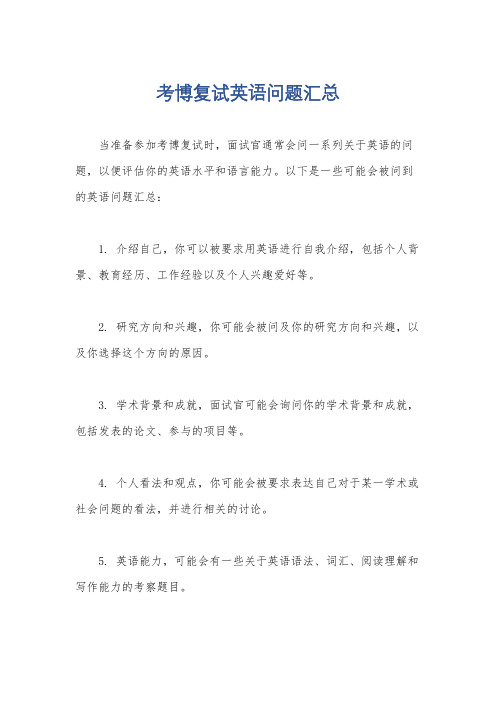
考博复试英语问题汇总
当准备参加考博复试时,面试官通常会问一系列关于英语的问题,以便评估你的英语水平和语言能力。
以下是一些可能会被问到的英语问题汇总:
1. 介绍自己,你可以被要求用英语进行自我介绍,包括个人背景、教育经历、工作经验以及个人兴趣爱好等。
2. 研究方向和兴趣,你可能会被问及你的研究方向和兴趣,以及你选择这个方向的原因。
3. 学术背景和成就,面试官可能会询问你的学术背景和成就,包括发表的论文、参与的项目等。
4. 个人看法和观点,你可能会被要求表达自己对于某一学术或社会问题的看法,并进行相关的讨论。
5. 英语能力,可能会有一些关于英语语法、词汇、阅读理解和写作能力的考察题目。
6. 学术交流能力,面试官可能会模拟学术交流的情境,要求你
用英语进行学术交流或者辩论。
7. 学术道德和诚信,可能会有一些关于学术道德和诚信的问题,以测试你的学术诚信意识。
以上这些问题只是一些可能会被问到的例子,具体问题会根据
学校和专业的不同而有所差异。
在准备考博复试时,建议你多加练习,准备充分,以确保能够从多个角度全面完整地回答面试官的问题。
祝你考试顺利!。
医学考博面试常见的英语提问
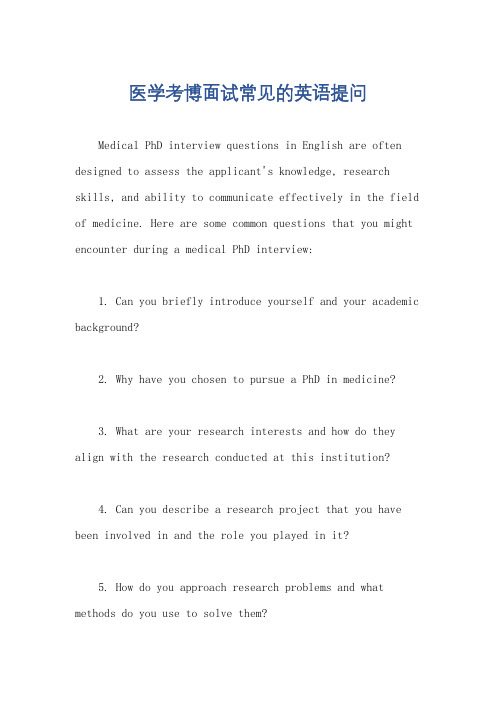
医学考博面试常见的英语提问Medical PhD interview questions in English are often designed to assess the applicant's knowledge, research skills, and ability to communicate effectively in the field of medicine. Here are some common questions that you might encounter during a medical PhD interview:1. Can you briefly introduce yourself and your academic background?2. Why have you chosen to pursue a PhD in medicine?3. What are your research interests and how do they align with the research conducted at this institution?4. Can you describe a research project that you have been involved in and the role you played in it?5. How do you approach research problems and what methods do you use to solve them?6. What are the most significant challenges you have faced in your research and how did you overcome them?7. How do you stay up-to-date with the latest research and developments in your field?8. What is your understanding of the ethical implications of medical research?9. How do you plan to contribute to the field of medicine through your PhD research?10. How do you manage your time and stay organized when working on multiple projects?These questions aim to assess your knowledge, research skills, and ability to communicate effectively. It's important to prepare for these questions by familiarizing yourself with the research conducted at the institution, thinking about your own research interests and experience, and practicing your ability to articulate your ideas andthoughts clearly and confidently.In addition to these common questions, the interviewer may also ask more specific questions related to your research proposal or the field of medicine in general. It's important to be prepared to answer these questions by having a thorough understanding of your research proposal and the relevant literature in your field.Remember, the interview is not just about answering questions correctly, but also about demonstrating your enthusiasm, passion, and commitment to the field of medicine. Be prepared to share your thoughts and ideas, and show the interviewer why you are the ideal candidate for the PhD program.Finally, don't forget to ask questions during the interview. This is your opportunity to learn more about the program, the research conducted at the institution, and the opportunities available to you as a PhD student. Take advantage of this opportunity to gather information thatwill help you make an informed decision about whether this program is right for you.。
刑法学博士英语面试常见问题
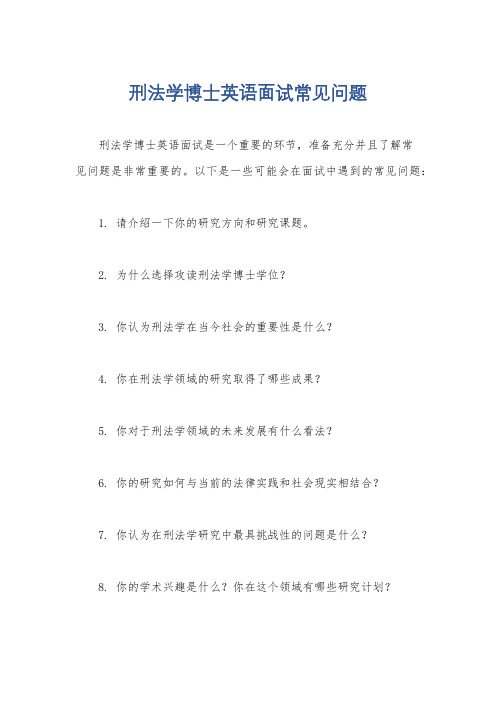
刑法学博士英语面试常见问题
刑法学博士英语面试是一个重要的环节,准备充分并且了解常
见问题是非常重要的。
以下是一些可能会在面试中遇到的常见问题:
1. 请介绍一下你的研究方向和研究课题。
2. 为什么选择攻读刑法学博士学位?
3. 你认为刑法学在当今社会的重要性是什么?
4. 你在刑法学领域的研究取得了哪些成果?
5. 你对于刑法学领域的未来发展有什么看法?
6. 你的研究如何与当前的法律实践和社会现实相结合?
7. 你认为在刑法学研究中最具挑战性的问题是什么?
8. 你的学术兴趣是什么?你在这个领域有哪些研究计划?
9. 你对于国际刑法合作有什么看法?
10. 你是如何看待刑法学与其他学科的交叉研究的?
在回答这些问题时,应该注意清晰、简洁地表达自己的观点和想法。
此外,还要展现出对刑法学领域的深入理解和对相关问题的思考,以及对未来发展的前瞻性思考。
同时,也可以举一些具体的案例或者研究成果来支撑自己的观点,以展现自己的学术能力和研究潜力。
希望这些信息对你有所帮助。
物理博士面试英语常见问题
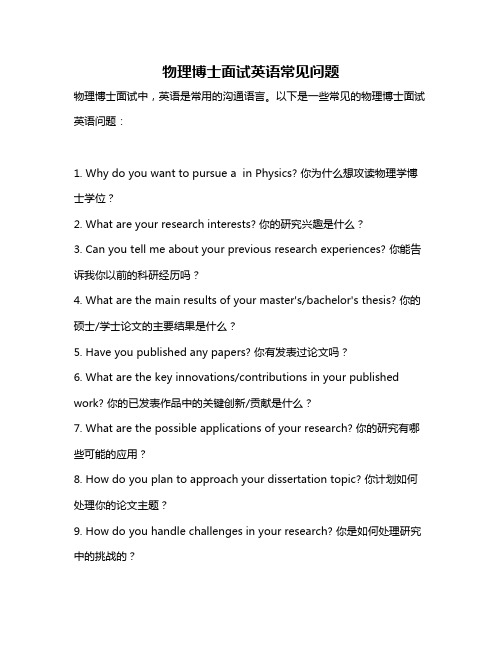
物理博士面试英语常见问题物理博士面试中,英语是常用的沟通语言。
以下是一些常见的物理博士面试英语问题:1. Why do you want to pursue a in Physics? 你为什么想攻读物理学博士学位?2. What are your research interests? 你的研究兴趣是什么?3. Can you tell me about your previous research experiences? 你能告诉我你以前的科研经历吗?4. What are the main results of your master's/bachelor's thesis? 你的硕士/学士论文的主要结果是什么?5. Have you published any papers? 你有发表过论文吗?6. What are the key innovations/contributions in your published work? 你的已发表作品中的关键创新/贡献是什么?7. What are the possible applications of your research? 你的研究有哪些可能的应用?8. How do you plan to approach your dissertation topic? 你计划如何处理你的论文主题?9. How do you handle challenges in your research? 你是如何处理研究中的挑战的?10. What are the ethical considerations in your research? 你的研究中有什么伦理考虑?11. How do you plan to contribute to the field of Physics with your research? 你计划如何通过你的研究为物理学领域做出贡献?12. Can you work independently? 你能独立完成工作吗?13. How do you handle criticism in your research? 你是如何处理研究中的批评的?14. What are your future career plans? 你未来的职业规划是什么?15. Why did you choose this university/program for your ? 你为什么选择这所大学/博士项目?以上问题仅供参考,实际面试中,面试官可能会根据具体情况和申请人的个人经历进行调整。
解析考博英语面试中的常见问题和答案
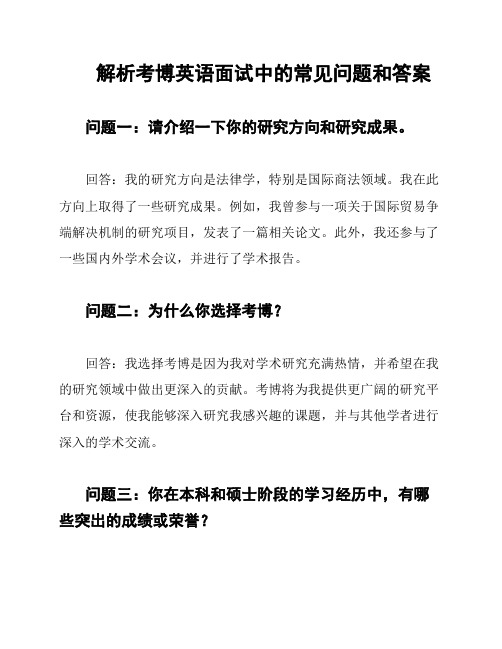
解析考博英语面试中的常见问题和答案问题一:请介绍一下你的研究方向和研究成果。
回答:我的研究方向是法律学,特别是国际商法领域。
我在此方向上取得了一些研究成果。
例如,我曾参与一项关于国际贸易争端解决机制的研究项目,发表了一篇相关论文。
此外,我还参与了一些国内外学术会议,并进行了学术报告。
问题二:为什么你选择考博?回答:我选择考博是因为我对学术研究充满热情,并希望在我的研究领域中做出更深入的贡献。
考博将为我提供更广阔的研究平台和资源,使我能够深入研究我感兴趣的课题,并与其他学者进行深入的学术交流。
问题三:你在本科和硕士阶段的学习经历中,有哪些突出的成绩或荣誉?回答:在本科阶段,我获得了学习优秀奖学金,并连续三年被评为优秀学生。
在硕士阶段,我在研究中获得了导师的肯定,并被邀请参与一项重要项目的研究工作。
此外,我还在研究生期间发表了一篇与我的研究方向相关的学术论文。
问题四:你在研究中遇到的最大困难是什么,你是如何解决的?回答:在我的研究中,我遇到的最大困难是数据收集和分析过程中的复杂性。
为了解决这个问题,我采取了以下策略:首先,我进行了详细的文献研究,以找到相关的数据来源;其次,我利用统计软件对数据进行分析,并请教了一些专业人士来验证我的分析结果;最后,我与我的导师和同事进行了讨论和交流,以确保我的研究方法和结论的准确性。
问题五:你认为自己在哪些方面需要进一步提升?回答:我认为我在学术写作和口头表达方面还有提升的空间。
虽然我在研究中进行了大量的写作工作,并进行了一些学术报告,但我希望能够更加准确和清晰地表达我的观点,并提高我的学术写作技巧。
为此,我准备参加一些学术写作和演讲技巧的培训,并积极参与学术交流活动,以提升自己的表达能力。
以上是对考博英语面试中常见问题的简要解析和答案。
希望对您有所帮助!。
考博英语面试中的常见问题和答案详解
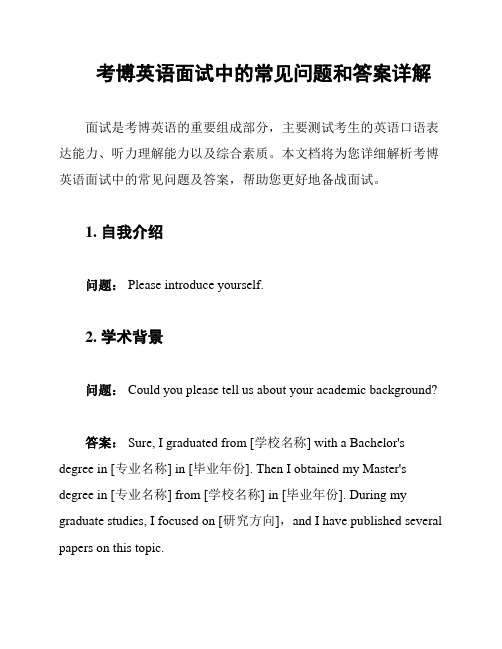
考博英语面试中的常见问题和答案详解面试是考博英语的重要组成部分,主要测试考生的英语口语表达能力、听力理解能力以及综合素质。
本文档将为您详细解析考博英语面试中的常见问题及答案,帮助您更好地备战面试。
1. 自我介绍问题: Please introduce yourself.2. 学术背景问题: Could you please tell us about your academic background?答案: Sure, I graduated from [学校名称] with a Bachelor's degree in [专业名称] in [毕业年份]. Then I obtained my Master's degree in [专业名称] from [学校名称] in [毕业年份]. During my graduate studies, I focused on [研究方向],and I have published several papers on this topic.3. 研究计划问题: What is your research plan if you are admitted to our program?答案: If I am fortunate enough to be admitted to your program, I will first familiarize myself with the research interests and projects of my potential advisor. Then, based on my background and interests, I will propose a research plan and discuss it with my advisor. I plan to focus on [研究内容],and I hope to contribute to the field through my research.4. 为什么选择我们学校/专业问题: Why did you choose our school/program?答案: Your school/program has a great reputation in [专业领域] and I have always admired the academic atmosphere here. I also found that the faculty members in your program share my research interests, especially [教授姓名], whose work has inspired me a lot. I believe thatyour program will provide me with the best resources and opportunities to grow both personally and professionally.5. 未来职业规划问题: What are your career plans after obtaining a doctoral degree?6. 英语水平问题: How would you describe your English level?7. 个人兴趣爱好问题: Can you tell us about your hobbies?答案: Sure, in my spare time, I like reading, especially academic books and papers related to my research field. I also enjoy playing sports, such as badminton and swimming, to keep myself healthy. Additionally, I like traveling and experiencing different cultures.以上是考博英语面试中的常见问题及答案详解,希望对您有所帮助。
破解英语博士面试常见问题及答案
破解英语博士面试常见问题及答案1. 个人介绍问题问题:请介绍一下你自己。
答案:我是一名英语博士申请者,拥有深厚的英语语言和文学知识。
我在本科期间专注于英语学习,并在研究生阶段深入研究了英语文学。
我对英语的语法、修辞手法和文学作品有着较深的理解。
我热爱研究和探索英语语言和文学的各个方面,并希望将来能够在这个领域做出一定的贡献。
2. 研究动机问题问题:你为什么选择攻读英语博士学位?答案:我选择攻读英语博士学位的主要原因是因为我对英语语言和文学的研究充满激情。
我希望能够深入了解英语语言的本质和其在不同文学作品中的运用。
通过进行深入研究,我可以进一步提高自己的学术能力,并在未来成为一名有影响力的英语学者。
此外,攻读博士学位也是我实现个人职业目标的重要一步。
3. 研究领域问题问题:你的研究领域是什么?为什么对这个领域感兴趣?答案:我的研究领域是英语文学。
我对英语文学感兴趣的原因是因为通过研读英语文学作品,我可以深入理解英语语言的运用和不同文学流派的发展。
我希望能够挖掘出一些在过去被忽视的文学作品,并对其进行深入分析和解读。
通过研究英语文学,我可以更好地理解文学作品背后的文化和历史背景,进而提高自己的文学鉴赏能力。
4. 研究计划问题问题:你有没有具体的研究计划或课题?请简要介绍一下。
答案:我计划在我的博士研究中探索英语文学中的女性主义主题。
我将研究不同时期的女性作家的作品,分析她们对社会、家庭和性别的看法,并探讨她们的作品对当代社会的影响。
通过这个研究,我希望能够提供对女性主义文学的新的理解,并为女性主义思想的发展做出一定的贡献。
5. 合作能力问题问题:你是否具备良好的合作能力?请举例说明。
答案:是的,我具备良好的合作能力。
在我的研究生期间,我曾参与过多个小组项目,需要与其他成员紧密合作完成共同的目标。
在这些项目中,我充分发挥自己的沟通和组织能力,与团队成员密切合作,并成功地完成了各项任务。
我相信良好的合作能力是取得成功的关键,我将在博士研究中继续发展和运用这一能力。
考研考博英语面试--介绍家乡山东烟台
My Hometown - YantaiHello, everyone. My name is [姓名], and I come from Shandong Province. Specifically, I am from Yantai City, which is a coastal city located in the southeast of Shandong Province.Yantai has a rich cultural and historical heritage, as it was one of the earliest cities to be opened to the world as a treaty port in the late 19th century. Today, it remains an important economic center in Shandong, with a thriving manufacturing sector and a bustling port that handles millions of tons of cargo each year.But what really sets Yantai apart is its stunning natural beauty. The city is home to several scenic areas, including the Yantai Mountain Scenic Area, the Penglai Pavilion Scenic Area, and the Changyu Wine Culture Museum, among others. These sites offer breathtaking views of the sea, the mountains, and the vineyards that stretch across the countryside.In addition to its natural beauty, Yantai is also known for its delicious seafood, which is some of the best in China. From fresh oysters to succulent crabs, the seafood in Yantai is a must-try foranyone who visits the city.Overall, Yantai is a wonderful place to live, work, and visit. Its combination of history, culture, and natural beauty make it a unique and unforgettable destination that I am proud to call home. If you have any questions about my hometown, feel free to ask me. Thank you for listening.。
考研考博英语面试--介绍家乡内蒙古鄂尔多斯
My Hometown - OrdosHello, everyone. My name is . As a native of Inner Mongolia, I would like to use this opportunity to introduce you to my hometown, Ordos.Ordos is a prefecture-level city located in Inner Mongolia. It is known for its abundant mineral resources, especially coal, which has led to its booming economy in recent years. The city also boasts a number of historic and cultural landmarks, such as the Genghis Khan Mausoleum and the Xiangshawan Desert.One of the highlights of Ordos is its unique culture and customs. The city is home to the Mongolian ethnic group, who have a distinct culture and way of life. Traditional Mongolian festivals, music, dance, and cuisine are celebrated throughout the year, giving visitors a glimpse into the richness and diversity of this ancient culture.In addition to its cultural and natural attractions, Ordos also offers a variety of modern amenities, such as shopping malls, entertainment venues, and top-rated restaurants serving local and international cuisine.Overall, Ordos is a city that combines history, culture, and modernity, making it both an interesting and convenient place to live or visit. I hope my introduction has given you a taste of what this unique Inner Mongolian city has to offer. Thank you for listening.。
博士面试英语口语
博士面试英语口语下面是整理的博士面试英语口语,希望对大家有帮助。
英语面试问题集锦:1 What is your greatest strength?I feel that my strongest asset is my ability to stick to things to get them done. I feel a real sense of accomplishment when I finish a thing and it turns out just as I’d planned. I’ve set some high goals for myself. For example, I want to graduate with highest distinction. And even though I had a slow start in my freshman year, I made up for it by doing an honor’s thesis. 2 What is your greatest weakness?I'm such a perfectionist that I will not stop until a job is well done. 3 How do you feel about your progress to date?I think I did well in school. In fact, in a number of courses I received the highest exam scores in the class. As an intern for the X Company, I received some of the highest evaluations that had been given in years.4 What has been your greatest accomplishment?My greatest accomplishment is that I was enrolled by China Agricultural University in 2009. 5 Tell me about yourfamily.There are five people in my family, my parents, my older sister and my younger brother. My parents are farmers. They are honest and candid. 6 Describe your experimental skills.During the past three years, under the strict guidance of my supervisor, I have learned systematically the theory of profession and got the basic manipulative skills about the analysis of veterinary drugs. I have successfully finished the subject “Pharmacokinetics and pharmadynamics study of compound amoxicillin intramammary infusion in lactating cows after repeated administrations”and grasped some experimental skills, such as sample extraction, sample clean-up, instrument operation. 7 What’s your hobby?In my spare time, I like reading and travel. Reading makes me intelligent and travel broaden my horizens.8为什么想读博,将来愿意从事的方向,读博时的打算?The most important reason for my further study is that I am long for doing scientific research in Veterinary Drugs Residue. It is a pleasure to be with my favorite scientific research for lifetime. In a word, I am looking forward to making a solid foundation for future profession after three years study here.If I have the opportunity to further my study, I will work harder than before and make great achivements in the field scientific research.10 How do you solve the problems that you meet in the experiment?If I meet some difficult problems, I could insult my supervisor and search related professional literatures to solve them. Confidence is very important and we should believe in ourselves.最新博士生英语面试口语的技巧精选1篇1. 自我介绍(self-introduce)Good morning. I am glad to be here for this interview. First let me introduce2.考博原因(reasons for my choice)There are several reasons.I have been deeply impressed by the academic atmosphere when I came here last summer. In my opinion, as one of the most famous xxxxxxin our country, it provide people with enough room to get further enrichment . This is the first reason.The second one is I am long for doing research in xxxxxxthroughout my life. Its a pleasure to be with my favoritexxxxxxfor lifetime. I suppose this is the most important factor in my decision.In a word, I am looking forward to making a solid foundation for future profession after two years study here.3.博士生期间你的(de)计划(plans in the postgraduate study)In a word, I am looking forward to making a solid foundation for future profession after two years study here.4 .介绍你的(de)家乡(about hometown)最新博士生英语面试口语的技巧精选2篇博士生英语面试口语经典问题传统面试问题(Sample Traditional Interview Questions)1、What can you tell me about yourself?(关于你自己,你能告诉我些什么?)这一问题如果面试没有安排自我介绍的时间的话。
- 1、下载文档前请自行甄别文档内容的完整性,平台不提供额外的编辑、内容补充、找答案等附加服务。
- 2、"仅部分预览"的文档,不可在线预览部分如存在完整性等问题,可反馈申请退款(可完整预览的文档不适用该条件!)。
- 3、如文档侵犯您的权益,请联系客服反馈,我们会尽快为您处理(人工客服工作时间:9:00-18:30)。
Personal/Professional
1. Tell me about yourself. Use three words to describe you.
2. How did you become interested in psychology? How did you become interested in (specific interest area)?
3. What would you be doing if you were not in psychology?
4. What are your personal strengths?
5. What are your personal weaknesses? What have you done to deal with your shortcomings?
6. What are your goals after graduate school? In 5 years? 10 years?
7. What do you have to contribute to us?
8. Why should we accept you over other equally qualified candidates?
9. What do you do in your spare time? To relax?
10. Tell me about your interest in this area (geography)?
11. Describe the most embarrassing moment in your life.
12. How do you deal with conflict/stress?
13. What would a therapist say the most difficult thing about you?
14. What would a therapist say the best thing about you?
15. What difficulties have you encountered as an international student?
16. What you can bring to the cohort?
17. What do you like to do in your free time?
18. If you can write a book today, what would you write?
19. Tell me a time you are stressed out, and how you deal with it?
20. Tell me something that does not show on your application.
21. If you can have dinner and conversation with an celebraty, who would it want to be and why? What would you ask him?
22. What is the #1 question you would like me to ask you?
Research
1. What would be your ideal research topic?
2. What are your research interests? How did you get interested in this topic?
3. What is the clinical relevance of your research?
4. How do you describe the relationship of research and practice?
Clinical
1. What population do you want to work with and why?
2. What population have you worked with before?
3. What do you think would be your greatest strength as a therapist?
4. What about clinical work do you enjoy most?
5. What about clinical work do you enjoy least?
6. Talk about a case that you think you did a good job and why, and explain what you learned from it.
7. Talk about a case that you think you did not do a good job and why.
8. What is your theoretical orientation? What do you think of _____ approach?
9. What are the challenges you expect to face as a therapist?
10. What is your experience with individual/couples/family/group/inpatient/etc. treatment?
Diversity
1. How do you define cultural competence?
2. With what multicultural or diverse populations have you worked?
3. What are your strengths in working with minorities?
4. What are your weaknesses in working with minorities?
5. What variables/issues are of concern to you in working with specific populations?
6. What reading/didactic experiences influence the way you think about diverse populations?
7. How did your own identity influenced your clinical work?
Supervision/Mentoring
What do you expect to get from supervision?
What supervision style do you like best?
What type of comments and feedback work best for you?
Social Justice
1. How do you define social justice?
2. How to achieve social justice?
3. What social justice actions have you worked on in the past?
Recruiting/ Interest & Fit
1. Why are you interested in our program? Why are you applying to this particular program?
2. How do you see our program fitting with your career goals?
4. Which of your interest areas are (not) addressed by our program?
5. With which faculty member would you most like to work?
6. What are the advantages to you of this program?
7. What worries you about coming to this program?
8. What might you not get at this program that you want?
9. What are your feelings about coming to this state?
10. What do you think of the program now that you've heard more about it?
(资料素材和资料部分来自网络,供参考。
可复制、编制,期待你的好评与关注)。
